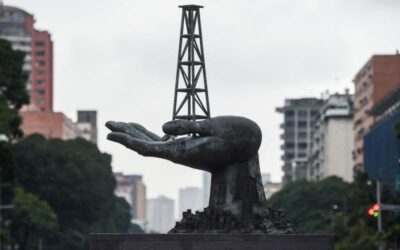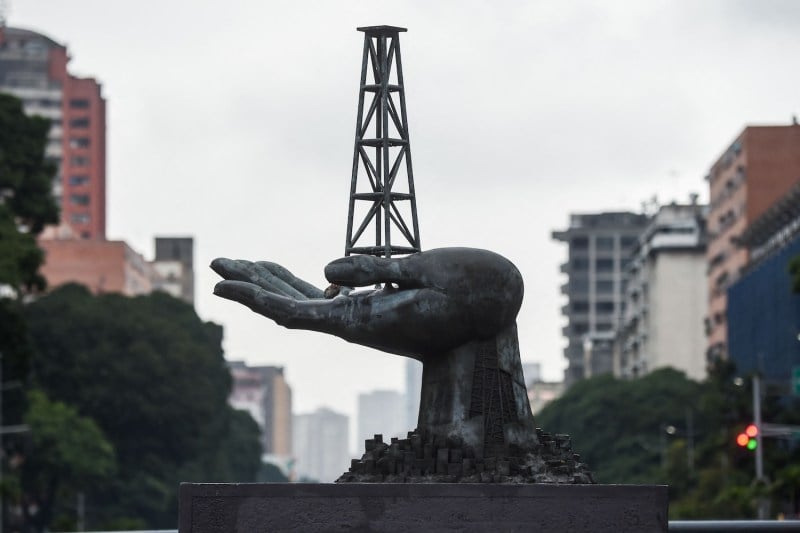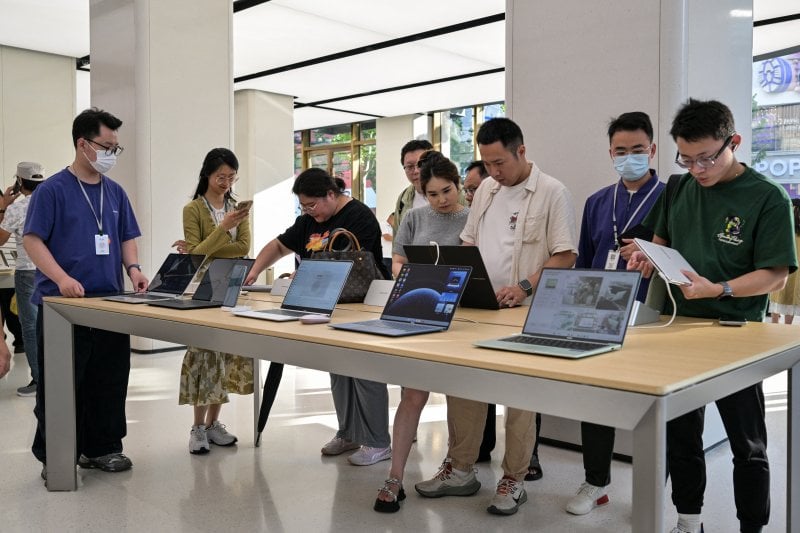Is Trump Transforming America’s Middle East Policy?

Is Trump Transforming America’s Middle East Policy?
The rising salience of Saudi Arabia, Qatar, and the UAE.
The dust is now settling on U.S. President Donald Trump’s tour of the Middle East. Trump visited Saudi Arabia, the United Arab Emirates, and Qatar in the first scheduled foreign visit of his second term, and he drew attention for receiving economic commitments worth nearly $2 trillion, his lifting of sanctions on Syria, and a set of advanced semiconductor deals. Trump also caused a stir with a speech in Riyadh in which he said there would be no more “lectures on how to live” from Washington—a sign that he was repudiating past U.S. policies in the Middle East.
But does Trump actually represent a break from the past? On the latest episode of FP Live, I spoke with F. Gregory Gause, a visiting scholar at the Middle East Institute and a professor emeritus of international affairs at Texas A&M University’s Bush School of Government and Public Service. Subscribers can watch the full interview on the video box atop this page or download the FP Live podcast. What follows here is a condensed and edited transcript.
The dust is now settling on U.S. President Donald Trump’s tour of the Middle East. Trump visited Saudi Arabia, the United Arab Emirates, and Qatar in the first scheduled foreign visit of his second term, and he drew attention for receiving economic commitments worth nearly $2 trillion, his lifting of sanctions on Syria, and a set of advanced semiconductor deals. Trump also caused a stir with a speech in Riyadh in which he said there would be no more “lectures on how to live” from Washington—a sign that he was repudiating past U.S. policies in the Middle East.
But does Trump actually represent a break from the past? On the latest episode of FP Live, I spoke with F. Gregory Gause, a visiting scholar at the Middle East Institute and a professor emeritus of international affairs at Texas A&M University’s Bush School of Government and Public Service. Subscribers can watch the full interview on the video box atop this page or download the FP Live podcast. What follows here is a condensed and edited transcript.
Ravi Agrawal: I want to talk about the three countries he visited. Why are these Gulf monarchies increasing in salience? Is it just about money?
Gregory Gause: I think money is way up there. My line on this is that Trump did his first scheduled foreign trip to these three countries for the same reason that Willie Sutton robbed banks: That’s where the money is.
Trump’s vision of foreign policy is economic deal-making. That has come to the fore in the second Trump administration in a much more direct way. And these three countries have enormous sovereign wealth funds that they can use to invest in the United States and buy American products. They are comfortable with the notion of mixing private and public business. They have been conducting their affairs this way for quite some time. It really is “follow the money” on this one.
RA: And speaking of money, just how influential is Saudi Arabia? It has the biggest economy and biggest population in the region.
FGG: Saudi Arabia is a major power in the oil world. It’s the most stable major Arab country right now, supplanting Egypt as the leader of the Arab world because Saudi Arabia has this financial power.
But it lacks power on other scales. It’s not a serious military power. Interestingly, it has given up some of its ideological power. It represented Salafi Islam, and the Saudis would say, represented Sunni Islam in the world. But Crown Prince Mohammed bin Salman (MBS) is dialing down Saudi reliance on this particular interpretation of Islam as a source of legitimacy at home and power abroad. It is opening up socially and emphasizing Saudi national interests more than the interests of Islam. So in that sense, Saudi Arabia’s power is restricted to finance and to the diplomacy that can be buttressed by money.
RA: But I also keep hearing that Riyadh is running out of money. Oil prices are low, while public expenditure is very high. Important projects like Neom, the new city planned by MBS, are way over budget.
FGG: I don’t think Saudi Arabia is running out of cash because it’s not running out of credit. Its debt-to-GDP ratio is relatively low, somewhere just north of 30 percent, whereas the United States has a debt-to-GDP ratio of more than 100 percent. So the Saudis can go on the credit markets to make up deficits. There is a realization that $60-per-barrel oil means that they’re going to be less ambitious, so some of these big projects like Neom are being scaled back. So, though there is some trimming, I don’t see a fiscal crisis right now in Saudi Arabia.
RA: One thing in Saudi Trump’s Riyadh speech has gotten a fair bit of attention. He told the audience that the United States is done lecturing. This was seen as a denouncement of decades of Western policy and intervention. How unusual did that feel?
FGG: Well, it wasn’t surprising because this has been Trump’s line for some time. And it reflects a chastened view about America’s ability to remake the politics of the Middle East. The failures in Afghanistan and Iraq are very present in the minds of Republicans and Democrats, neoconservatives, regular conservatives, MAGA people, liberals, neoliberals, everybody. And thus, there’s been a ratcheting down of American ambitions.
Trump, to use an inappropriate metaphor in Saudi Arabia, was very much preaching to the choir. The Saudis who would have wanted an American president to talk about freedom and human rights are now either cowed or in jail. Mohammed bin Salman has really opened up the country socially in ways that I never thought I would see in my lifetime. But he has also dramatically closed what was already a relatively small margin for people to speak out politically.
RA: The UAE was the second leg of Trump’s visit. It’s a country that has long used its oil wealth to diversify into other areas. Dubai and Abu Dhabi, of course, look a lot like Singapore in the desert. How do the UAE’s interests dovetail with American foreign policy today?
FGG: The UAE was the front-runner of the Gulf oil countries for economic diversification, largely because it’s a federal system, and the Emirate of Dubai didn’t have that much oil. And so the ruling family in Dubai, the Al Maktoums, emphasized building a nonoil economy based on trade and tourism. And that’s what makes Dubai Dubai. And Dubai really is the place where ambitious young Arabs would like to work, where people who want economic dynamism go. Now Abu Dhabi is trying to be that, and Riyadh is trying to be that, too.
RA: And we know that Doha, the capital of Qatar, is actively trying to follow that model as a financial capital, but also by investing in soft power trappings like the FIFA Men’s World Cup. And Qatar is also more muscular in its views—bankrolling Al Jazeera, funding the Muslim Brotherhood. It was a conduit to the Taliban for many years, and recently, it’s been a mediator between Israel, the United States, and Hamas. When Trump was president the first time, the other Gulf countries began a blockade against Qatar.
What are Doha’s geopolitical ambitions?
FGG: Both Qatar and the United Arab Emirates have the wherewithal to project their ambitions on a broader scale. Doha basically took the lead in this with Al Jazeera, with sports, and with this very controversial (and in some ways dangerous) policy of backing Islamists. They’ve hedged their bets by also hosting the largest U.S. military base in the Middle East, al-Udeid Air Base, which Trump visited on this trip.
Qatar’s vision is that Islamists are the wave of the future, at least in part. And Qatar doesn’t want to be isolated. This is 180 degrees from what the leadership of the UAE thinks. The leadership of UAE is very much against the Muslim Brotherhood.
After the Arab Spring, the Qataris and Emiratis fought it out in Egypt, with the Qataris funded the Muslim Brotherhood government of Mohamed Morsi, and the Emiratis and the Saudis funded the military coup of Gen. Abdel Fattah al-Sisi, who’s currently president of Egypt. That’s why we saw the blockade, orchestrated by Saudi and the Emirates, of Qatar in 2017 and why President Trump accused Qatar of funding terrorism.
The Qataris have been able to crawl back from that by emphasizing that they are a stable place for America’s largest military base, but also, that they can be a conduit. They were with Hamas, obviously, and they have been with the Taliban in Afghanistan. Particularly after the Hamas attack on Israel, there are lots of people in the United States, particularly in Congress, questioning the close U.S. relationship with Qatar, given that Qatar funded Hamas. The Qataris have been able to make themselves useful to American administrations. And, you know, a new Air Force One donated to the Trump administration, it doesn’t hurt either.
RA: Since you bring up Hamas and Qatar’s role as a go-between there, how important is the war in Gaza and the Palestinian cause to each of these countries? These are all monarchies, so at some level, they don’t need to care what people think.
FGG: Qatar and the UAE are in this unique situation where they don’t really have to worry about public opinion because the citizen population is such a small percentage of the overall population. And to be crude about it, if somebody in the Emirates or Qatar is interested in politics, the government will give them a job in the government to keep them busy. If they’re really opposed to what the government’s doing, they will be imprisoned.
Saudi Arabia is different. Only about a third of the population is foreign workers. And although the crown prince is very interested eventually in a relationship with Israel, what has happened in Gaza has increased the cost of Saudi normalization with Israel as the Palestinian issue becomes more salient. And Iran is seen as less of a threat after the near-total destruction of Hamas, the decimation of Hezbollah, the fall of the Syrian Assad regime, and the demonstration of Iran’s military weakness through failures in the missile and drone exchanges with Israel.
One of the reasons that the Saudis were interested in relations with Israel was because they saw Israel as an ally against Iran. So as the cost of dealing with Israel goes up, the value of Israel as an ally goes down. And the Saudis are not moving on the American bipartisan desire for normalization with Israel without some major shift in the Israeli position on a two-state solution and a Palestinian state.
RA: As America is getting closer to these Gulf countries, the Gulf countries are also hedging their bets and getting closer to countries such as China and India as well. In an “America First” world, countries do as they want in an à la carte fashion. How does all that play into U.S. foreign-policy thinking?
FGG: I think that you’re right, that all of these countries are hedging their bets as they see shifts in global power. But there are also some very practical things here. China is one of the biggest consumers of energy exports for the UAE, for Saudi Arabia, for Iran. And so China is central to the economic lifeblood of these countries. And they are receiving Chinese imports and investing in China. Saudi Aramco, the state oil company, has invested in refineries in China.
One thing that I’ve heard from Saudis for a decade is, “Don’t make us choose between you and China.” Now, the worry about Chinese influence in the Gulf is on Trump’s mind when doing business deals in that part of the world.
RA: Another element is tech and artificial intelligence, with key deals struck between the United States and Saudi Arabia and the UAE. Of course, a driving foreign-policy principle for both the Trump and Biden administrations was the prevention of China, which both these countries are friendly with, from accessing the highest end chips.
FGG: I was surprised at both the extent and the suddenness of the deals with Saudi Arabia and the UAE for supplying the chips. The Biden administration put heavy restrictions on these exports, particularly on places like the UAE and Saudi Arabia that had strong economic relationships with China. Operation of these AI enterprises requires huge amounts of energy, which the Gulf countries can provide cheaply. That’s their comparative advantage here.
So if American AI concerns can tap into the energy resources of the Gulf monarchies, then that might be an advantage. But the disadvantage is whether you can protect intellectual property in a pretty wide open economic field.
RA: Democrats in the United States are, of course, already arguing that the United States is giving away too much to these Gulf countries, and that their closeness to China or Russia could lead to them sharing things that could hinder American objectives.
Greg, Trump did not go to either Israel or Iran last week. But for different reasons, both were very much part of the news and were watching the trip very closely. On Iran, Trump seems to be pushing for a new nuclear deal. What might that do to the region?
FGG: A nuclear deal with Iran would certainly lower tensions in the region. Interestingly enough, all the Gulf countries are supportive of this, which is a shift from their formerly enthusiastic support of maximum pressure.
In September 2019, Iran launched a drone and missile attack on the most important Saudi oil facilities, in reaction to that maximum pressure. It was a direct attack on what America has long said was the reason it was in the Persian Gulf: protecting the free flow of oil. And the Trump administration basically did nothing. That was a real lesson for the Saudis—and indirectly for the Emiratis—that they couldn’t count on the United States to back them up if it wasn’t seen as being in the U.S.’s interest.
So while the Saudis and the Emiratis and the Qataris are more than happy to roll out the red carpet, or the lavender carpet, for President Trump, they worry about American reliability.
RA: There’s another country that worries about American reliability: Israel. If you were Prime Minister Benjamin Netanyahu and advocated for Trump to be president, you might now be realizing that America First isn’t necessarily always a good thing for you. How did Israel view last week’s trip? What does it mean for that relationship going forward?
FGG: It is remarkable for the president who did so much for Netanyahu in his first term—from moving the U.S. Embassy to Jerusalem to acknowledging Israel’s annexation of the Golan Heights and withdrawing from the Iran nuclear deal—without receiving much in return. The Israelis have a very jaundiced view of the new government in Syria and were surprised when Trump lifted the sanctions. The Netanyahu government was advocating a military strike on Iranian nuclear facilities, but Trump said, no, we’ll negotiate.
Part of this is that the president likes fast deals, and Gaza was not giving him a fast deal. He wanted the political win of announcing a cease-fire and political horizon in Gaza. And neither the Israeli government nor what’s left of Hamas was willing to make those deals.
When the Trump administration walks away, the question for Netanyahu is what it means. Does it mean that like Canada and Britain and France, the United States takes a publicly negative position and threatens sanctions on Israel for the renewal of the offensive in Gaza? Or does it mean the U.S. just walks away and doesn’t care how Israel behaves in Gaza?
So far, the indications are toward the latter. The Trump administration will not pressure on Netanyahu vis-à-vis Gaza, nor will it try to broker a political solution. And in the meantime, the president will try to find other deals to make.
RA: We touched on Syria at the start. How important is the lifting of sanctions on Syria? Because of course, a lot of the Gulf countries have been waiting to pour money in, and now they can do so without American retribution.
FGG: Syria is a playing field among regional powers. Turkey is the closest ally of the new government in Syria and had been the protector of interim Syrian President Ahmed al-Sharaa’s group, Hayat Tahrir al-Shaym. And so Turkey has the inside track, both politically and economically.
The Israelis don’t like that. They have been bombing sites in Syria, saying that they’re trying to destroy the former regime’s weapons and what the Iranians left behind. The Gulf countries, led by Saudi Arabia, want to be a player in Syrian politics. They’ve already agreed to pay off Syria’s loans to the World Bank, but will have serious competition from Turkish companies in terms of rebuilding Syria. And of course, the regional power that lost out is Iran, which was the Assad regime’s major regional ally.
So the Iranians are on the back foot, the Saudis are competing with the Turks, and the Israelis are playing a dangerous destabilizing game in Syria, where most regional powers (along with the United States and Europe) would like to see a stable new government.
RA: When you put everything that we’ve been discussing together, how much of a break from the past is Trump’s Middle East policy? One school of thought is that Trump represents a big shift, with no “lectures” or interventions. But another argument could be that America’s lectures were always just that—and that various administrations have always acted purely on interests and not values. In that sense, Trump doesn’t represent a real shift. Where do you fall on that spectrum?
FGG: I am more on the no-shift side. Undoubtedly, in the immediate post-9/11 period, the United States used military force directly and indirectly to change the regional status quo. But other than that brief period of time, every American administration has wanted to have a good relationship with Saudi Arabia. And there’s more continuity in the Trump administration approach to Saudi Arabia. The last three American presidents—President Barack Obama, President Trump, President Joe Biden—all came into office saying, “We’ve got to pivot away from the Middle East. We’ve got to spend less time and effort on the Middle East.” And they all ended up spending a lot of time and effort in the Middle East. I don’t think that the Trump approach is radically different than past administrations. A little more in your face about transactionalism, a little less about common strategic interests.
But I think we should recall that in a month, the Trump administration could have a very different view of Iran. We’ll see how these negotiations go. Despite the president’s words of encouragement about the negotiations, if he doesn’t get a deal, he has said he is going to pivot to military pressure on Iran, and that would create a very different regional atmosphere for sure.
Ravi Agrawal is the editor in chief of Foreign Policy. X: @RaviReports
Stories Readers Liked
In Case You Missed It
A selection of paywall-free articles

Four Explanatory Models for Trump’s Chaos
It’s clear that the second Trump administration is aiming for change—not inertia—in U.S. foreign policy.























Join the Conversation
Commenting is a benefit of a Foreign Policy subscription.
Subscribe
Subscribe
Already a subscriber?
.
View Comments
Join the Conversation
Join the conversation on this and other recent Foreign Policy articles when you subscribe now.
Subscribe
Subscribe
Not your account?
View Comments
Join the Conversation
Please follow our comment guidelines, stay on topic, and be civil, courteous, and respectful of others’ beliefs.
View Comments
Change your username |
Log out
Change your username:
CANCEL
Confirm your username to get started.
The default username below has been generated using the first name and last initial on your FP subscriber account. Usernames may be updated at any time and must not contain inappropriate or offensive language.